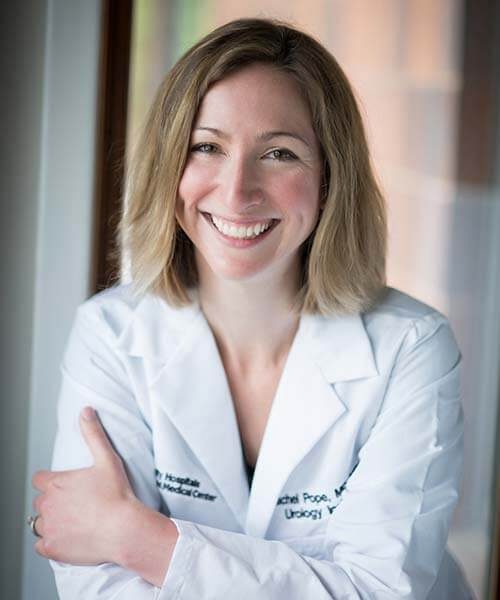Leading the National Conversation in Female Sexual Health
November 28, 2022
Innovations in Urology |Fall 2022
According to data published in February 2022, approximately 1.3 million women annually enter menopause. For these women, menopausal symptoms are common: 75 percent of women experience vasomotor symptoms, 60 percent experience urogenital symptoms and 45 percent experience psychosocial symptoms.
 Rachel Pope, MD,MPH
Rachel Pope, MD,MPH“In the Female Sexual Health (FSH) division at University Hospitals, we see women every day who have menopausal symptoms, such as new onset pain with intercourse and vaginal dryness,” says Rachel Pope, MD,MPH,, Division Chief, Female Sexual Health, University Hospitals Urology Institute. “We know from research, sexual health problems tend to increase with perimenopause and menopause as women’s bodies change. We need to get people to talk about this. It’s important but understudied and underacknowledged.”
Providing Education on Female Sexual Health
In summer 2022, Dr. Pope and her colleagues held University Hospitals' first symposium on Female Sexual Health and Menopause to offer provider and community education and to encourage patients and physicians to be aware of the issues and to talk to each other.
Dr. Pope recruited a stellar panel of expert speakers, including Lisa Larkin, MD, an international expert on basal motor symptoms with menopause; Rachel Rubin, MD, a board-certified urologist and sexual medicine specialist; Susan Kellogg, CRNP, Ph.D., who specializes in vuvlar disorders; Sharon Parish, MD, a leading author on a study of testosterone for low desire after menopause; and keynote speaker Jennifer Gunter, MD, FACP, NCMP, IF, an internist and certified menopause clinician.
Approximately 100 people attended in person and another 40 attended virtually. Dr. Pope says UH continues to offer the symposium via asynchronous virtual Continuing Medical Education (CME) and providers can receive CME credits for attending the lectures.
View the Female Sexual Health & Menopause Symposium 2022 through the CWRU CME portal. Select "Enduring Materials" in the navigation and find the "Female Sexual Health & Menopause" event under "Other Topics."
Dr. Pope plans to make this symposium an annual event, tackling specific topics each year.
“Next year, we will focus on the pelvic floor,” she says. “Our very own Karen Connor, a UH pelvic floor physical therapist, will take the lead, and we hope to have another outstanding panel of renowned experts. As we did this year, we’d like to offer hands-on skill training for providers to learn how to assess and treat pelvic floor issues that interfere with sexual function. We’ll also engage the community with sessions specifically for women.”
Multidisciplinary Female Sexual Health program at UH
Although there are other Female Sexual Health programs, says Dr. Pope, most focus specifically on gynecology and urology.
“Women may see three or four providers trying to get help for menopausal symptoms,” she says. “Through our Female Sexual Health division, we offer a multidisciplinary, comprehensive approach to patient care. We tie together gynecology, urology, pelvic floor health and behavioral health. It’s rare to find all these interdisciplinary components working together seamlessly; however at University Hospitals, Sheryl Kingsberg, PhD, Division Chief, OB/GYN Behavioral Medicine, University Hospitals Cleveland Medical Center, and an internationally recognized female sexual health expert, has been advocating for a program such as this for some time and we are glad to be able to now offer it.”
Many female sexual health needs are addressed in the private sector but are associated with significant out-of-pocket costs. Dr. Pope wants to also provide this support to women in an academic setting and to train medical providers and residents so female sexual health is a normal part of their education.
Expanding the Body of Knowledge
In addition to clinical care, Dr. Pope and her colleagues engage in substantive research. For example, Dr. Pope and Anna Myers, CNP, published a study of sexual functioning in women with lichen sclerosis, a progressive autoimmune disease that can affect the genital area. Dr. Pope says about 56 percent of women with lichen sclerosis also experience sexual dysfunction or sexual pain. She is also collaborating with Myers and Jean Marino, CNP, to study the microbiome and genetic components of lichen sclerosis in the hopes of better understanding why some women get the disease and how it impacts quality of life and sexual dysfunction.
With such a large portion of the population going through, or in, menopause, these women will need sexual health support. Dr. Pope’s goal is for UH to provide comprehensive support to this growing cohort in Ohio.
For more information about the UH Division of Femal Sexual Health or the symposium, contact Rachel Pope, MD at 216-844-3009.
Contributing Expert:
Rachel Pope, MD,MPH
Chief, Division of Female Sexual Health
University Hospitals Urology Institute
Clinical Professor
Case Western Reserve University School of Medicine


